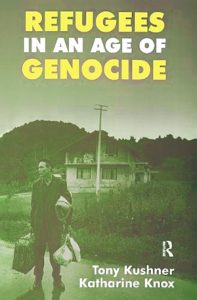Refugees in an Age of Genocide

Author: Tony Kushner & Katharine Knox
Publisher: Routledge
Year of Publication: 1999
Print Length: 560 pages
Genre: Non-Fiction / History, Social Science, Migration & Refugee Studies
Area: The United Kingdom (UK)
People: Jews, Spanish, Armenian, Belgian, Chilean, Hungarian, Kurds, Polish, Ugandan Asian, Vietnamese, Yugoslav, Zairean
Topic: History, Culture & Society, Cultural Heritage/Legacy, Local & Global, Asylum & Asylum Seekers, Refugees & Forced Migration, Asylum & Refugee System, Responses to Refugees, Camps, Care, Host Community, Integration, Refugee Local Integration, Social Movement, Social Network, Social Impact, Refugee Economies, Politics & Power, Torture, Violence & Mass Violence, War, World War I, World War II, Holocaust, Kindertransport, Civil War, Conflict & Post-Conflict, Crisis / Crises, Persecution, Detention, Dispersal, Genocide, Nazi, Fascism; Memory, Remembering and Forgetting; Testimonies, The Notion of Home
This is a study of the history of global refugee movements over the 20th century, ranging from east European Jews fleeing Tsarist oppression at the turn of the century to asylum seekers from the former Zaire and Yugoslavia. Recognizing that the problem of refugees is a universal one, the authors emphasize the human element which should be at the forefront of both the study of refugees and responses to them.
Table of Contents
List of Illustrations
Foreword by Sir Herman Ouseley, Commission for Racial Equality
Preface
Acknowledgements
Maps
Afterword: Kosovo
Introduction: Refugees, Place and Memory
World history, local studies and the refugee / Localities and the refugees / International change and the ‘refugee crisis’ / Defining refugees and common trends in twentieth-century movements
PART 1: THE CLOSING OF ASYLUM, 1900-1932
1. Refugees in the Age of Mass Immigration: From the late Nineteenth Century to the First World War
The origins of the Jewish refugee movement / The growth of anti-alienism in Britain and beyond / Refugees and local society
2. Refugees and the First World War
Anti-alienism in the First World War / The arrival of Belgian refugees / The local impact of Belgian refugees / The memory and significance of the Belgian refugees
3. Triumphant Anti-Alienism: The Absence of Asylum 1919-1932
The absence of Armenian refugees in post-1918 Britain / Post-war anti-alienism / The background to Atlantic Park Hostel / The establishment of Atlantic Park Hostel in the context of international politics / Atlantic Park and British Jewish politics / Life in Atlantic Park Hostel and the local impact
PART 2: THE FASCIST ERA, 1933-1945
4. Refugees from the Spanish Civil War
The rise of fascism and the Spanish Civil War / Support for the Republicans and assistance to the refugees / The arrival of the children and life in the camps / Responses to the refugees / The legacy of the Basque refugees
5. Refugees from Nazism, 1933-1939
Introduction: The meaning of asylum during the 1930s / Patterns of refugee movement, 1933-1937 / The Anschluss and Austrian Jewry / ‘Kristallnacht’ and after / Local responses in Britain to the Jewish plight / The Refugee Children’s Movement / Domestic service and nursing / Smaller work schemes / Local initiatives / Conclusion: Place and identity
6. Refugees, the Second World War and the Holocaust
War, internment and after / War refugees and local memory / The Holocaust and local place / The end of mass rescue / The destruction of Polish Jewry / Local knowledge of the ‘Final Solution’ / The final stages of the Holocaust / Survivors and the local world / Conclusion
PART 3. REFUGEES FROM THE COLD WAR
7. Polish Refugees : Assistance to Wartime Heroes
The Polish background and settlement in Britain / The transition to life in Britain / Life in the camps and employment in Britain / Local and national responses to the Poles / The aftermath of the Polish settlement
8. Refugees from Hungary: Anti-Communist Fervour Takes Hold
The Hungarian background / The Hungarian refugee movement / Responses to the Hungarian refugees / Life in Britain / Hampshire and the refugees / Concluson
PART 4. GOVERNMENT ENFORCED DISPERSAL DURING THE 1970s AND 1980s
9. Ugandan Asian Exiles: The Colonial Connection
The background to the Ugandan Asian crisis / Responses to the Ugandan Asian refugees / The dispersal policy / Life in Britain / Conclusion
10. Refugees from Chile: A Gesture of International Solidarity
The Chilean background / The settlement of Chilean refugees / Settlement in Britain / British reception of the Chileans / The Chileans’ experience of settlement
11. Refugees from Indo-China: A Media-Driven Resettlement Scheme?
The flight from persecution / Offers of asylum / Settlement in Britain / The lives of Vietnamese refugees in Britain / The reception camps and beyond / Popular responses to the Vietnamese / Refugee integration / Conclusion
PART 5. WORLD ASYLUM SEEKERS AT THE END OF THE CENTURY: CLOSING THE DOORS
12. The Kurds – A Moment of Humanity in an Era of Restriction?
The Kurdish background / Responses in Britain / Responding to the Kurdish refugees at a local level / Kurdish refugee life
13. Refugees from former Yugoslavia: The Last “Programme” Refugees?
The collapse of Yugoslavia / British responses to the crisis / The former Yugoslavs in Britain / Local responses / Conclusion
14. Refugees from the Former Zaire: The Context of Colour
The Zairean background / The Zairean refugee movement / The use of detention and the assault on asylum / Responses to Zaireans in Britain / Local repsonses and Zairean refugees in Hampshire / Conclusion: The future of asylum
CONCLUSION: Asylum, Refugees and ‘Home’
The nature of asylum / Refugees / ‘Home’
Notes
Bibliography
Index

Tony Kushner is James Parkes Professor of History at the University of Southampton. His research interests include Jewish migration history, refugee studies, representation and memory of the Holocaust, bystander studies, heritage, history and memory, and history of racisms. His recent project is a cultural history of Jacob Harris, an eighteenth-century Jewish triple murderer. He is also working on a study of co-presents to the Holocaust with Dr Aimee Bunting.
Source: https://www.southampton.ac.uk/people/5wxxgp/professor-tony-kushner#research
More from Tony Kushner in this library, click here.

Katharine Knox is working at the Joseph Rowntree Charitable Trust since 2019, leading the Power and Accountability Programme. She has previously worked at the Joseph Rowntree Foundation (JRF) and the Joseph Rowntree Reform Trust (JRRT), running JRF’s climate justice programme and working as JRRT’s grants adviser. Her background includes policy and research management roles in the charitable sector, including Equally Ours and the Refugee Council, and the public sector, at the Audit Commission. She has also done stints in academia and works in a freelance capacity on climate justice and other issues.
Source: https://www.jrct.org.uk/katharine-knox
More from Katharine Knox in this library, click here.
